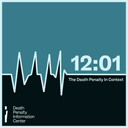
On June 11, 2024, the Ohio Legislative Black Caucus (OLBC) held a press conference highlighting the group’s legislative priorities, which included the death penalty as a key concern. Noting “the racial cycle of injustice perpetrated by the death penalty,” State Representative Terrence Upchurch, who is also the president of the OLBC, insisted that legislative leadership move toward “dismantling this flawed system and establishing a new legacy of equality and justice in Ohio.”
Rep. Upchurch and other members of the OLBC espoused many of the key takeaways from the Death Penalty Information Center’s latest report, Broken Promises: How a History of Racial Violence and Bias Shaped Ohio’s Death Penalty. Chief among their concerns were the race of victim effect and the potential for innocent people to be sentenced to death due to bias among prosecutors, judges, and juries. As noted in Broken Promises, homicides involving white female victims are six times more likely to result in an execution than homicides involving Black victims. The report also revealed that innocent Black Ohioans collectively spent nearly 200 years on death row for crimes they did not commit. The stories included in the report underscore the OLBC’s concerns about racial bias tainting capital proceedings. Jurors, expert witnesses, and attorneys who made overtly racist statements participated in sentencing multiple Black Ohioans to death.
“Ohio’s death penalty system reflects a legacy of racial violence and bias,” said Rep. Upchurch. “Black defendants face a prejudiced process, making a fair trial nearly impossible.” Senate Bill 101 and House Bill 259, both advocating for death penalty abolition, have bipartisan support in both chambers. Neither bill has progressed since being referred to committee in 2023.
Press Conference — 6-11-2024 — Celebrating Juneteenth, The Ohio Channel, June 11, 2024.



